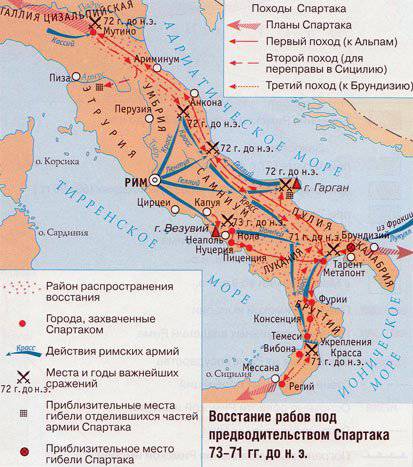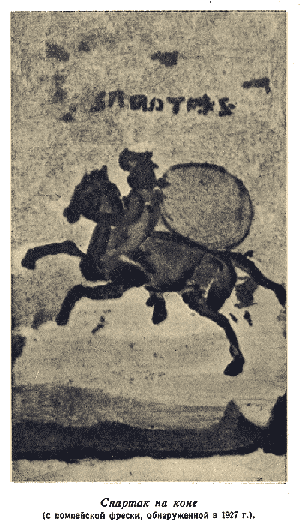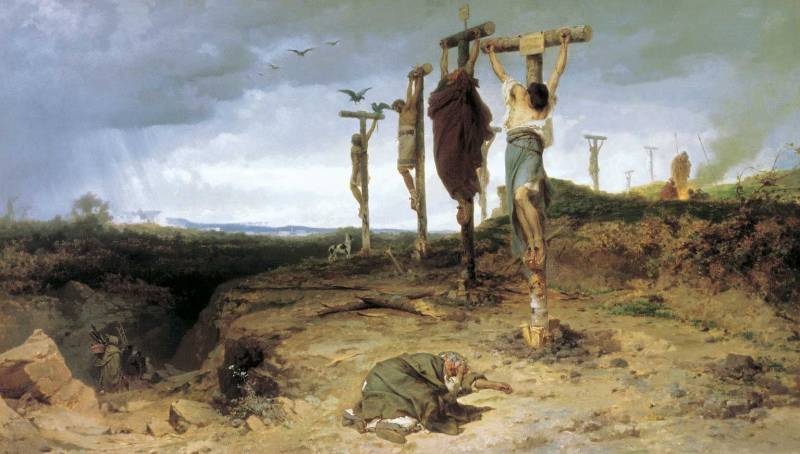Great commanders. Spartacus
 The uprising of Spartacus, which began in the city of Kapuya in 74 BC. e., not only significantly influenced the development of Rome as a state, but also left its mark on the entire world history. The uprising of Spartacus is no longer an exclusively historical fact, having become, with the name of its leader, a symbol of the liberation struggle.
The uprising of Spartacus, which began in the city of Kapuya in 74 BC. e., not only significantly influenced the development of Rome as a state, but also left its mark on the entire world history. The uprising of Spartacus is no longer an exclusively historical fact, having become, with the name of its leader, a symbol of the liberation struggle.For the first time the artistic image of Spartacus was used by the French revolutionaries. It remains unknown who first remembered again the invincible leader of the insurgent slaves through the years of oblivion, but he liked the minds of the agitated French. Of course, there was a certain idealization, but we should not forget about the merits of Spartacus himself, as the authors of the works that have reached us speak of him as a noble and courageous person. Even distinguished by an extremely hostile attitude not only towards the uprising itself, but also towards its participants, Roman historians did not deny the positive personal qualities of Spartacus. For example, Flor, who does not hide his scornful attitude towards the rebel slaves, nevertheless admitted that during his last battle: “Spartacus, who fought bravely in the first row, died at the hands of the enemy, as befits a great commander”. Plutarch, more impartial in his judgments, characterizes Spartacus as “a man not only distinguished by outstanding courage and physical strength, but his intelligence and gentleness who elevated him above his position, giving greater resemblance to the Hellenes than could be supposed about a man of his tribe”.
Very little is known about Spartacus. For example, it is known that Spartacus was the birthplace of Thrace (present-day Bulgaria), and he was from the Meda tribe. The town of Sandanski, located in the Rhodope Mountains near the border with Yugoslavia, is considered to be the specific place of its birth. In 1 century BC. er on this place was the city of Medon, which was the capital of a large and strong tribe of honey, moreover, it took on many of the features inherent in Greek culture.
Probably, the Spartak family belonged to representatives of the local aristocracy, which confirms not only the consonance of the Spartak name with the generic name of Spartokids belonging to the Bosporan royal family, but also the confidence shown by them in managing a huge army.
The Thracians were warlike people, not only leading permanent tribal wars, but also supplying mercenaries in the armies of other states. These people considered military careers as the only acceptable for a man, especially for a representative of a noble family. Spartak is no exception. At the age of eighteen, he enlisted in the Roman army, where he was assigned to auxiliary Thracian units. Spartak has the opportunity to study from the inside the organization of the strongest army in the world, the practice of military operations, its strengths and weaknesses. Subsequently, this experience came in handy. After a few years of service, Spartak deserted, returning to Thrace, - at this time there began a war against the Romans.
Spartacus twice came to Rome as a slave. In the first case, he managed to escape. But after a while, Spartak was captured for the second time, and he was sold to Lentulus Batiatu, the owner of the Kapuan school of gladiators. The bulk of the pupils were Gauls and Thracians, whom the Romans considered to be militant and recalcitrant people.
Most likely, among them were many prisoners of war, who had just recently parted from freedom and were not yet accustomed to slavery. In order to organize a rebellion in such a situation, there was not enough for the leader, which was Spartak, who was a born leader and organizer, a brave and enterprising person.
But the plot was revealed, and its participants could be saved only by acting quickly and decisively. Seventy-eight gladiators made an unexpected attack on the guards and, having broken the doors of the school, disappeared beyond the city limits, as Plutarch writes, “thrifty taking with them the kitchen knives and skewers they got somewhere.”
In general, armament was a rather acute problem for the army of Spartacus throughout the war. Sallust writes that at the beginning the rebels, instead of copies, used sharpened and burned stakes with the help of which it was possible to cause practically the same harm as iron ”... Later, the rebels continued to produce weapon personally, making a centralized purchase of iron and copper from merchants, they also did not neglect the weapons of the defeated Roman soldiers.
Together with his small detachment, Spartak headed towards Mount Vesuvius, the summit of which was similar to a natural fortification, where one could wait out for a while until the detachment was replenished with escaped slaves from nearby estates. Indeed, the number of the detachment led by Spartak quickly increased, which makes it acceptable to assume that there is an extensive conspiracy structure that encompasses all gladiatorial schools, as well as large slave farms in Kapuy and its surroundings.
Initially, Spartak relied on the help of German Enomay, Gaul Crix, and Samnit Gannik in organizing the conspiracy and uprising. Spartak immediately began to create an army modeled on the Roman, preferring to lose part of his army rather than allow it to descend to the level of an overgrown predatory gang.
However, the military purposes pursued by him can only be guessed at. Numerous researchers of the Spartak wars put forward various hypotheses: from a utopian attempt to overthrow the power in Rome and destroy slavery, to simple plans for the withdrawal of detachments of former slaves to their native land. But each of these hypotheses is equally vulnerable. The inconsistency of Mishulin's theory about the revolutionary impulse of slaves and the poorest representatives of the free population of Italy has long been recognized. It is equally meaningless to say that Spartak waged a systematic war with Rome. Spartak did not even seek to create its own state in the occupied territories. Most likely, he really wanted to leave Italy. However, Spartak is not limited to creating a semblance of military units capable of breaking through the Roman barriers, but intended to be dissolved on the other side of the Alps. Instead, he is working hard to create a full-fledged army.
For a time, the detachment of Spartacus did not leave his camp, broken on Mount Vesuvius. The rebellion of runaway gladiators inspired slaves from nearby estates. 74 year BC. er as the year preceding it turned out to be a poor harvest, which could not but affect the moods of the slaves, and so are in extremely difficult conditions of existence. The continuous increase in the number of the detachment of Spartacus seriously worried the landowners. However, the detachments they assigned to fight the rebellious slaves suffered one defeat after another. The situation around Capua became increasingly tense, causing concern to the Roman authorities. Pretor Guy Claudius Pulkhra, who led the three thousandth detachment, was sent to restore order. The task before them seemed to be extremely simple, because, having climbed onto Vesuvius, Spartak seemed to deliberately drive his squad into a trap. At the top of the mountain one could get along a single path, blocking which, Claudius could quietly wait for the moment when hunger forced the rebels to surrender.
Nevertheless, Spartak did not intend to give up, proving himself in the current critical situation as a smart and persistent person in achieving the goal. Using vines growing on the slopes of a mountain of wild grapes, the rebels erected stairs, which they descended from a three-hundred-meter height to the nearest flat platform. Then they struck the rear of the praetor Claudius, who was not expecting an attack, utterly defeating his detachment.
In Rome, after learning of the defeat of Claudius, they sent to the war with Spartak Praetor Publius Valerius Warinius. At first he managed to force Spartacus to retreat to the south, to the mountains. But the whole thing was that Spartak wanted to avoid a battle with unfavorable conditions for himself, because the number of his army was significantly inferior to the Roman. And he continued to retreat, seeking to be in the rich southern provinces of Italy, in order to replenish his army, to join the battle with the Romans.
Arriving in Lucania, a detachment of Spartacus approached the small town of Appiyev Forum and took it by storm. And it cost the army of Spartacus, for the most part, consisting of runaway slaves to enter the city, as its soldiers, having completely forgotten all the orders, began to barbarously rob local residents, raping their wives and daughters.
 At this moment, the tendency of Spartacus’s soldiers to the rapid disintegration of discipline, which Spartak feared, was particularly acute. Of course, he had no illusions about the consequences of the seizure of the city, but his army consisted of soldiers who were not bound by the oath, therefore it was difficult to call for discipline, thereby returning to service. The slaves who fell into his army did not hide their indignation at the need to obey, from which they, it seemed to them, they got rid of forever. However, to avoid looting was impossible. The supply of the army of Spartacus was based only on the withdrawal of food from the population, which logically explains his desire to attack wealthy slave-holding farms, which were more in the south of Italy, while in the north small peasant settlements were concentrated. Plundering large farms, Spartak replenished not only the reserves of provisions in them, but also increased the number of his troops — slaves working on estates, gladly joined the ranks of his army.
At this moment, the tendency of Spartacus’s soldiers to the rapid disintegration of discipline, which Spartak feared, was particularly acute. Of course, he had no illusions about the consequences of the seizure of the city, but his army consisted of soldiers who were not bound by the oath, therefore it was difficult to call for discipline, thereby returning to service. The slaves who fell into his army did not hide their indignation at the need to obey, from which they, it seemed to them, they got rid of forever. However, to avoid looting was impossible. The supply of the army of Spartacus was based only on the withdrawal of food from the population, which logically explains his desire to attack wealthy slave-holding farms, which were more in the south of Italy, while in the north small peasant settlements were concentrated. Plundering large farms, Spartak replenished not only the reserves of provisions in them, but also increased the number of his troops — slaves working on estates, gladly joined the ranks of his army.As a result of a series of victories over the scattered detachments of the praetor Varinia, the south of Italy completely passed into the hands of Spartacus. However, the rebels did not intend to stop there and, having ruined the southern regions of Italy, moved to the Alps.
Only then did the Senate clearly recognize the seriousness of the situation and appreciated the strength of the rebels. They began to act against Spartacus as against a serious opponent, really threatening Rome.
With all the evidence of the success achieved, the rebels ’troops did not differ in unity. The Gauls and Germans, who formed a large part of the army of Spartacus, considered it offensive to retreat after such triumphal victories over the Romans. However, Spartak continued to retreat from Italy, incidentally inflicting several more serious defeats on the Romans.
The uprising of Spartacus reached its apogee. The number of his troops reached 120000 people. The road to Transalpine Gaul was open, but Spartak, for some reason, is turning south again. The news of this caused a real panic in Rome. Spartacus became seriously compared with Hannibal and treated him as one of the most dangerous enemies of Rome.
Rome was preparing to meet with the army of Spartacus. The post of commander-in-chief was occupied by Mark Licinius Crassus, who had a personal interest in the speedy termination of hostilities and the defeat of Spartacus (his estates were heavily damaged by looting). In addition, Crassus wanted to get the glory of the commander and began, as they say, for his health - he made the advancing of the fighters. Thirty thousand people joined the ranks of the Roman army.
Crassus advanced to join the armies of the consuls. It is worth noting that in the Roman army reigned, if not panic, then very gloomy moods. In short, the morality of the Romans was not up to standard, after so many defeats, the Roman soldiers were afraid of the soldiers of Spartacus. Therefore, Crassus considered it necessary to teach his men a brutal lesson. To carry out reconnaissance, two legions were sent to the area where the army camp was located. Spartak sent two soldiers to the camp and fled to the camp during the ensuing battle, giving out the location of the main forces. Crassus ordered the punishment of the guilty and subjected the fled soldiers to a decimation - every tenth legionary was executed. After applying this harsh measure discipline in the ranks of the Romans was restored.
Meanwhile, having traveled the same route as when going to the Alps, Spartak stopped in the city of Furies at the southeastern tip of Italy and occupied the city itself, sitting on the surrounding heights. Spartak forbids its fighters to carry with them gold and silver, trying by all means to maintain discipline among them, stopping disputes between commanders.
Spartacus apparently sought to leave Italy through Sicily. However, this reasonable at first glance, the intention of Spartacus did not find support in the ranks of his army. A serious split was brewing among the rebels. A detachment from 10000 was separated from the main forces of the army of Spartacus and was immediately defeated by the Romans. Spartacus had already reached the coast and negotiated with the Cilician pirates so that they would help his army cross to Sicily. Despite the fact that an agreement was reached, the pirates for some reason did not keep their promise and did not give Spartak their ships.
Spartacus, pursued by Crassus, retreated to the southernmost tip of Italy, on the coast of a narrow strait between the Apennine Peninsula and Sicily. He still did not give up thoughts about a possible crossing to the island, attempting to build improvised boats and rafts of logs and barrels. However, the imminent clash with Crassus was obvious and inevitable.
However, Crassus was not too eager to fight, because the geographical features of the Regian Peninsula, which was narrow and elongated, suggested to him an even simpler solution. The army of Crassus conducted a 55-kilometer shaft across the isthmus, reinforcing it with a moat and palisades. Once again, the Romans hoped that the rebels would be forced to surrender in order to avoid starvation. At this time, the situation in Rome is changing dramatically. Assessing the seriousness of the threat, the Senate transfers all power over the army of Pompey, who arrived from Spain. Crassus, who wanted to win the laurels of the winner, should act as quickly as possible, otherwise he would have had a bad reputation for failure.
Learning of this, Spartak attempted to hold peace negotiations with the Romans, suggesting that Crassus, being not enthusiastic about Pompey's participation in the war, would be more compliant. However, the Roman commander did not even respond to the proposal of the enemy, so the army of Spartacus was forced to storm the Roman fortifications. On a rainy night, his soldiers piled the moat with fascines, and, overturning the guard units of the Romans, were able to break free. Crassus's army followed Spartacus, who was leaving for Brundisium, whose army began to fall apart in pieces. The end of the war, tragic for Spartacus, was close, the situation in his camp became increasingly tense.
Spartacus, retreating to the Petely mountains, was pursued by Quint, the legate of Crassus, and also the quaestor Skroff. However, as soon as Spartak turned against the Romans, they rushed to flee and escaped with difficulty, but carried the injured quaestor from the battlefield. This success turned the heads of runaway slaves, ruining Spartacus. His soldiers now forgot to think about retreating, not only refusing to carry out the orders of their superiors, but, blocking their path, forced them to lead the army through Lucania back to the Romans.

In addition, the retreat of the army of the rebels from the coast was also due to information about the arrival of the army of Lucullus in Brundisium. Spartacus understood that the general battle was inevitable. Crassus himself wanted to fight Spartak as quickly as possible, because Pompey's army was inexorably approaching every day.
Roman troops overtook the army of Spartacus, not allowing them to go far from Brundisium. From different sides of the army of Crass replenished with more and more reinforcements, and as a result Spartacus was forced to build his entire army.
Spartacus, on horseback making his way to Crassus, was wounded in the thigh with a spear by Campanian aristocrat Felix. The grave wound caused Spartacus to dismount, but he, dropping to one knee and losing a lot of blood, continued to fight. The great commander of the ancient world Spartak fell in a fierce battle. The place of his burial remained unknown, since his body was not originally found on the battlefield.
Information